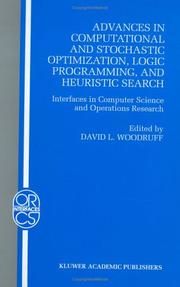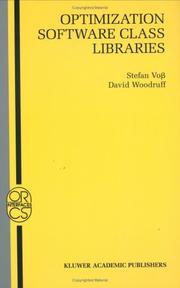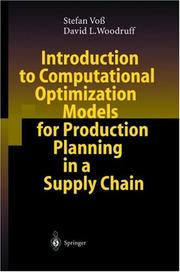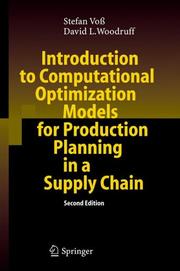| Listing 1 - 10 of 16 | << page >> |
Sort by
|

ISBN: 030648109X 140207302X Year: 2003 Publisher: New York, NY : Springer US : Imprint: Springer,
Abstract | Keywords | Export | Availability | Bookmark
 Loading...
Loading...Choose an application
- Reference Manager
- EndNote
- RefWorks (Direct export to RefWorks)
On March 15, 2002 we held a workshop on network interdiction and the more general problem of stochastic mixed integer programming at the University of California, Davis. Jesús De Loera and I co-chaired the event, which included presentations of on-going research and discussion. At the workshop, we decided to produce a volume of timely work on the topics. This volume is the result. Each chapter represents state-of-the-art research and all of them were refereed by leading investigators in the respective fields. Problems - sociated with protecting and attacking computer, transportation, and social networks gain importance as the world becomes more dep- dent on interconnected systems. Optimization models that address the stochastic nature of these problems are an important part of the research agenda. This work relies on recent efforts to provide methods for - dressing stochastic mixed integer programs. The book is organized with interdiction papers first and the stochastic programming papers in the second part. A nice overview of the papers is provided in the Foreward written by Roger Wets.
Computer security --- Computer networks --- Stochastic integrals --- Stochastic programming --- Security measures --- Mathematical optimization. --- Operations research. --- Management science. --- Electrical engineering. --- Calculus of variations. --- Decision making. --- Computers. --- Optimization. --- Operations Research, Management Science. --- Electrical Engineering. --- Calculus of Variations and Optimal Control; Optimization. --- Operations Research/Decision Theory. --- Theory of Computation. --- Automatic computers --- Automatic data processors --- Computer hardware --- Computing machines (Computers) --- Electronic brains --- Electronic calculating-machines --- Electronic computers --- Hardware, Computer --- Computer systems --- Cybernetics --- Machine theory --- Calculators --- Cyberspace --- Deciding --- Decision (Psychology) --- Decision analysis --- Decision processes --- Making decisions --- Management --- Management decisions --- Choice (Psychology) --- Problem solving --- Isoperimetrical problems --- Variations, Calculus of --- Maxima and minima --- Electric engineering --- Engineering --- Quantitative business analysis --- Operations research --- Statistical decision --- Operational analysis --- Operational research --- Industrial engineering --- Management science --- Research --- System theory --- Optimization (Mathematics) --- Optimization techniques --- Optimization theory --- Systems optimization --- Mathematical analysis --- Simulation methods --- System analysis --- Decision making --- Computer science. --- Operations Research, Management Science . --- Electrical and Electronic Engineering. --- Calculus of Variations and Optimization. --- Operations Research and Decision Theory.

ISBN: 0792380789 Year: 1998 Publisher: Boston, Mass. Kluwer Academic
Abstract | Keywords | Export | Availability | Bookmark
 Loading...
Loading...Choose an application
- Reference Manager
- EndNote
- RefWorks (Direct export to RefWorks)

ISBN: 1402070020 030648126X Year: 2002 Publisher: New York, NY : Springer US : Imprint: Springer,
Abstract | Keywords | Export | Availability | Bookmark
 Loading...
Loading...Choose an application
- Reference Manager
- EndNote
- RefWorks (Direct export to RefWorks)
Optimization problems in practice are diverse and evolve over time, giving rise to - quirements both for ready-to-use optimization software packages and for optimization software libraries, which provide more or less adaptable building blocks for app- cation-specific software systems. In order to apply optimization methods to a new type of problem, corresponding models and algorithms have to be “coded” so that they are accessible to a computer. One way to achieve this step is the use of a mod- ing language. Such modeling systems provide an excellent interface between models and solvers, but only for a limited range of model types (in some cases, for example, linear) due, in part, to limitations imposed by the solvers. Furthermore, while m- eling systems especially for heuristic search are an active research topic, it is still an open question as to whether such an approach may be generally successful. Modeling languages treat the solvers as a “black box” with numerous controls. Due to variations, for example, with respect to the pursued objective or specific problem properties, - dressing real-world problems often requires special purpose methods. Thus, we are faced with the difficulty of efficiently adapting and applying appropriate methods to these problems. Optimization software libraries are intended to make it relatively easy and cost effective to incorporate advanced planning methods in application-specific software systems. A general classification provides a distinction between callable packages, nume- cal libraries, and component libraries.
Discrete mathematics --- Computer science. --- Operations research. --- Decision making. --- Software engineering. --- Computers. --- Computer mathematics. --- Mathematical optimization. --- Calculus of variations. --- Computer Science. --- Software Engineering. --- Theory of Computation. --- Computational Mathematics and Numerical Analysis. --- Optimization. --- Operation Research/Decision Theory. --- Calculus of Variations and Optimal Control; Optimization. --- Operations Research/Decision Theory. --- Isoperimetrical problems --- Variations, Calculus of --- Maxima and minima --- Deciding --- Decision (Psychology) --- Decision analysis --- Decision processes --- Making decisions --- Management --- Management decisions --- Choice (Psychology) --- Problem solving --- Operational analysis --- Operational research --- Industrial engineering --- Management science --- Research --- System theory --- Optimization (Mathematics) --- Optimization techniques --- Optimization theory --- Systems optimization --- Mathematical analysis --- Operations research --- Simulation methods --- System analysis --- Computer mathematics --- Electronic data processing --- Mathematics --- Automatic computers --- Automatic data processors --- Computer hardware --- Computing machines (Computers) --- Electronic brains --- Electronic calculating-machines --- Electronic computers --- Hardware, Computer --- Computer systems --- Cybernetics --- Machine theory --- Calculators --- Cyberspace --- Computer software engineering --- Engineering --- Decision making --- Mathematics—Data processing. --- Operations Research and Decision Theory. --- Calculus of Variations and Optimization.

ISBN: 3540000232 3662220547 3540247645 9783540000235 Year: 2003 Publisher: Berlin Springer
Abstract | Keywords | Export | Availability | Bookmark
 Loading...
Loading...Choose an application
- Reference Manager
- EndNote
- RefWorks (Direct export to RefWorks)
The book begins with an easy-to-read introduction to the concepts associated with the creation of optimization models for production planning. These concepts are then applied to well-known planning models, namely mrp and MRP II. From this foundation, fairly sophisticated models for supply chain management are developed. Another unique feature is that models are developed with an eye toward implementation. In fact, there is a chapter that provides explicit examples of implementation of the basic models using a variety of popular, commercially available modeling languages. .
Production management --- Production planning --- Mathematical optimization --- Business logistics --- Mathematical models --- Inventory control. Purchasing management --- Physical distribution --- Information technology. --- Business—Data processing. --- Production management. --- IT in Business. --- Operations Management. --- Manufacturing management --- Industrial management --- IT (Information technology) --- Technology --- Telematics --- Information superhighway --- Knowledge management --- Production planning - Mathematical models

ISBN: 9783540298786 3540298789 3642067557 9786610608768 1280608765 3540298797 Year: 2006 Publisher: Berlin Springer
Abstract | Keywords | Export | Availability | Bookmark
 Loading...
Loading...Choose an application
- Reference Manager
- EndNote
- RefWorks (Direct export to RefWorks)
provide models that could be used by do-it-yourselfers and also can be used toprovideunderstandingofthebackgroundissuessothatonecandoabetter job of working with the (proprietary) algorithms of the software vendors. In this book we strive to provide models that capture many of the - tails faced by ?rms operating in a modern supply chain, but we stop short of proposing models for economic analysis of the entire multi-player chain. In other words, we produce models that are useful for planning within a supply chain rather than models for planning the supply chain. The usefulness of the models is enhanced greatly by the fact that they have been implemented - ing computer modeling languages. Implementations are shown in Chapter 7, which allows solutions to be found using a computer. A reasonable question is: why write the book now? It is a combination of opportunities that have recently become available. The availability of mod- inglanguagesandcomputersthatprovidestheopportunitytomakepractical use of the models that we develop. Meanwhile, software companies are p- viding software for optimized production planning in a supply chain. The opportunity to make use of such software gives rise to a need to understand some of the issues in computational models for optimized planning. This is best done by considering simple models and examples.
Production planning --- Mathematical optimization. --- Production management. --- Business logistics. --- Production --- Optimisation mathématique --- Logistique (Organisation) --- Mathematical models. --- Planification --- Modèles mathématiques --- Gestion --- Production planning. --- Mathematical optimization --- Production management --- Business logistics --- Mechanical Engineering --- Management --- Engineering & Applied Sciences --- Business & Economics --- Industrial & Management Engineering --- Management Theory --- Mathematical models --- 658.51 --- Organization of production --- 658.51 Organization of production --- Supply chain management --- Manufacturing management --- Optimization (Mathematics) --- Optimization techniques --- Optimization theory --- Systems optimization --- Operations research. --- Decision making. --- Information technology. --- Business --- Econometrics. --- Economics. --- Operation Research/Decision Theory. --- Operations Management. --- IT in Business. --- Data processing. --- Industrial management --- Mathematical analysis --- Maxima and minima --- Operations research --- Simulation methods --- System analysis --- Logistics --- Operations Research/Decision Theory. --- IT (Information technology) --- Technology --- Telematics --- Information superhighway --- Knowledge management --- Operational analysis --- Operational research --- Industrial engineering --- Management science --- Research --- System theory --- Economics, Mathematical --- Statistics --- Business—Data processing. --- Deciding --- Decision (Psychology) --- Decision analysis --- Decision processes --- Making decisions --- Management decisions --- Choice (Psychology) --- Problem solving --- Decision making --- Business information services. --- Operations Research and Decision Theory. --- Business enterprises --- Information services
Digital
ISBN: 9783540298793 Year: 2006 Publisher: Berlin, Heidelberg Springer-Verlag Berlin Heidelberg
Abstract | Keywords | Export | Availability | Bookmark
 Loading...
Loading...Choose an application
- Reference Manager
- EndNote
- RefWorks (Direct export to RefWorks)
Operational research. Game theory --- Production management --- Information systems --- bedrijfseconomie --- speltheorie --- productieorganisatie --- logistiek --- operationeel onderzoek --- informatica management
Book
ISBN: 9783540298793 Year: 2006 Publisher: Berlin Heidelberg Springer Berlin Heidelberg
Abstract | Keywords | Export | Availability | Bookmark
 Loading...
Loading...Choose an application
- Reference Manager
- EndNote
- RefWorks (Direct export to RefWorks)
provide models that could be used by do-it-yourselfers and also can be used toprovideunderstandingofthebackgroundissuessothatonecandoabetter job of working with the (proprietary) algorithms of the software vendors. In this book we strive to provide models that capture many of the - tails faced by ?rms operating in a modern supply chain, but we stop short of proposing models for economic analysis of the entire multi-player chain. In other words, we produce models that are useful for planning within a supply chain rather than models for planning the supply chain. The usefulness of the models is enhanced greatly by the fact that they have been implemented - ing computer modeling languages. Implementations are shown in Chapter 7, which allows solutions to be found using a computer. A reasonable question is: why write the book now? It is a combination of opportunities that have recently become available. The availability of mod- inglanguagesandcomputersthatprovidestheopportunitytomakepractical use of the models that we develop. Meanwhile, software companies are p- viding software for optimized production planning in a supply chain. The opportunity to make use of such software gives rise to a need to understand some of the issues in computational models for optimized planning. This is best done by considering simple models and examples.
Operational research. Game theory --- Production management --- Information systems --- bedrijfseconomie --- speltheorie --- productieorganisatie --- logistiek --- operationeel onderzoek --- informatica management
Book
ISSN: 19316828 ISBN: 1461432251 146143226X Year: 2012 Volume: v. 67 Publisher: New York, NY : Springer New York : Imprint: Springer,
Abstract | Keywords | Export | Availability | Bookmark
 Loading...
Loading...Choose an application
- Reference Manager
- EndNote
- RefWorks (Direct export to RefWorks)
This book provides a complete and comprehensive guide to Pyomo (Python Optimization Modeling Objects) for beginning and advanced modelers, including students at the undergraduate and graduate levels, academic researchers, and practitioners. Modeling is a fundamental process in many aspects of scientific research, engineering, and business. This text beautifully illustrates the breadth of the modeling capabilities that are supported by this new software and its handling of complex real-world applications. Pyomo is an open source software package for formulating and solving large-scale optimization problems. The software extends the modeling approach supported by modern AML (Algebraic Modeling Language) tools. Pyomo is a flexible, extensible, and portable AML that is embedded in Python, a full-featured scripting language. Python is a powerful and dynamic programming language that has a very clear, readable syntax and intuitive object orientation. Pyomo includes Python classes for defining sparse sets, parameters, and variables, which can be used to formulate algebraic expressions that define objectives and constraints. Moreover, Pyomo can be used from a command-line interface and within Python's interactive command environment, which makes it easy to create Pyomo models, apply a variety of optimizers, and examine solutions. The text begins with a tutorial on simple linear and integer programming models. Information needed to install and get started with the software is also provided. A detailed reference of Pyomo's modeling components is illustrated with extensive examples, including a discussion of how to load data from sources like spreadsheets and databases. The final chapters cover advanced topics such as nonlinear models, stochastic models, and scripting examples.
Computer simulation. --- Mathematical optimization -- Computer simulation. --- Python (Computer program language). --- Civil & Environmental Engineering --- Engineering & Applied Sciences --- Operations Research --- Mathematical optimization --- Python (Computer program language) --- Optimization (Mathematics) --- Optimization techniques --- Optimization theory --- Systems optimization --- Computer modeling --- Computer models --- Modeling, Computer --- Models, Computer --- Simulation, Computer --- Mathematics. --- Computer science --- Computer mathematics. --- Computer software. --- Mathematical optimization. --- Operations research. --- Management science. --- Optimization. --- Simulation and Modeling. --- Computational Mathematics and Numerical Analysis. --- Math Applications in Computer Science. --- Mathematical Software. --- Operations Research, Management Science. --- Electromechanical analogies --- Mathematical models --- Simulation methods --- Model-integrated computing --- Scripting languages (Computer science) --- Mathematical analysis --- Maxima and minima --- Operations research --- System analysis --- Computer science. --- Software, Computer --- Computer systems --- Informatics --- Science --- Computer mathematics --- Discrete mathematics --- Electronic data processing --- Mathematics --- Computer science—Mathematics. --- Quantitative business analysis --- Management --- Problem solving --- Statistical decision --- Operational analysis --- Operational research --- Industrial engineering --- Management science --- Research --- System theory
Book
ISBN: 9781461432265 Year: 2012 Publisher: Boston MA Springer US
Abstract | Keywords | Export | Availability | Bookmark
 Loading...
Loading...Choose an application
- Reference Manager
- EndNote
- RefWorks (Direct export to RefWorks)
This book provides a complete and comprehensive guide to Pyomo (Python Optimization Modeling Objects) for beginning and advanced modelers, including students at the undergraduate and graduate levels, academic researchers, and practitioners. Modeling is a fundamental process in many aspects of scientific research, engineering, and business. This text beautifully illustrates the breadth of the modeling capabilities that are supported by this new software and its handling of complex real-world applications. Pyomo is an open source software package for formulating and solving large-scale optimization problems. The software extends the modeling approach supported by modern AML (Algebraic Modeling Language) tools. Pyomo is a flexible, extensible, and portable AML that is embedded in Python, a full-featured scripting language. Python is a powerful and dynamic programming language that has a very clear, readable syntax and intuitive object orientation. Pyomo includes Python classes for defining sparse sets, parameters, and variables, which can be used to formulate algebraic expressions that define objectives and constraints. Moreover, Pyomo can be used from a command-line interface and within Python's interactive command environment, which makes it easy to create Pyomo models, apply a variety of optimizers, and examine solutions. The text begins with a tutorial on simple linear and integer programming models. Information needed to install and get started with the software is also provided. A detailed reference of Pyomo's modeling components is illustrated with extensive examples, including a discussion of how to load data from sources like spreadsheets and databases. The final chapters cover advanced topics such as nonlinear models, stochastic models, and scripting examples.
Mathematical control systems --- Artificial intelligence. Robotics. Simulation. Graphics --- Computer. Automation --- Python (informatica) --- vormgeving --- automatisering --- informatica --- simulaties --- wiskunde
Digital
ISBN: 9781461432265 Year: 2012 Publisher: Boston, MA Springer US
Abstract | Keywords | Export | Availability | Bookmark
 Loading...
Loading...Choose an application
- Reference Manager
- EndNote
- RefWorks (Direct export to RefWorks)
Mathematical control systems --- Artificial intelligence. Robotics. Simulation. Graphics --- Computer. Automation --- Python (informatica) --- vormgeving --- automatisering --- informatica --- simulaties --- wiskunde
| Listing 1 - 10 of 16 | << page >> |
Sort by
|

 Search
Search Feedback
Feedback About
About Help
Help News
News